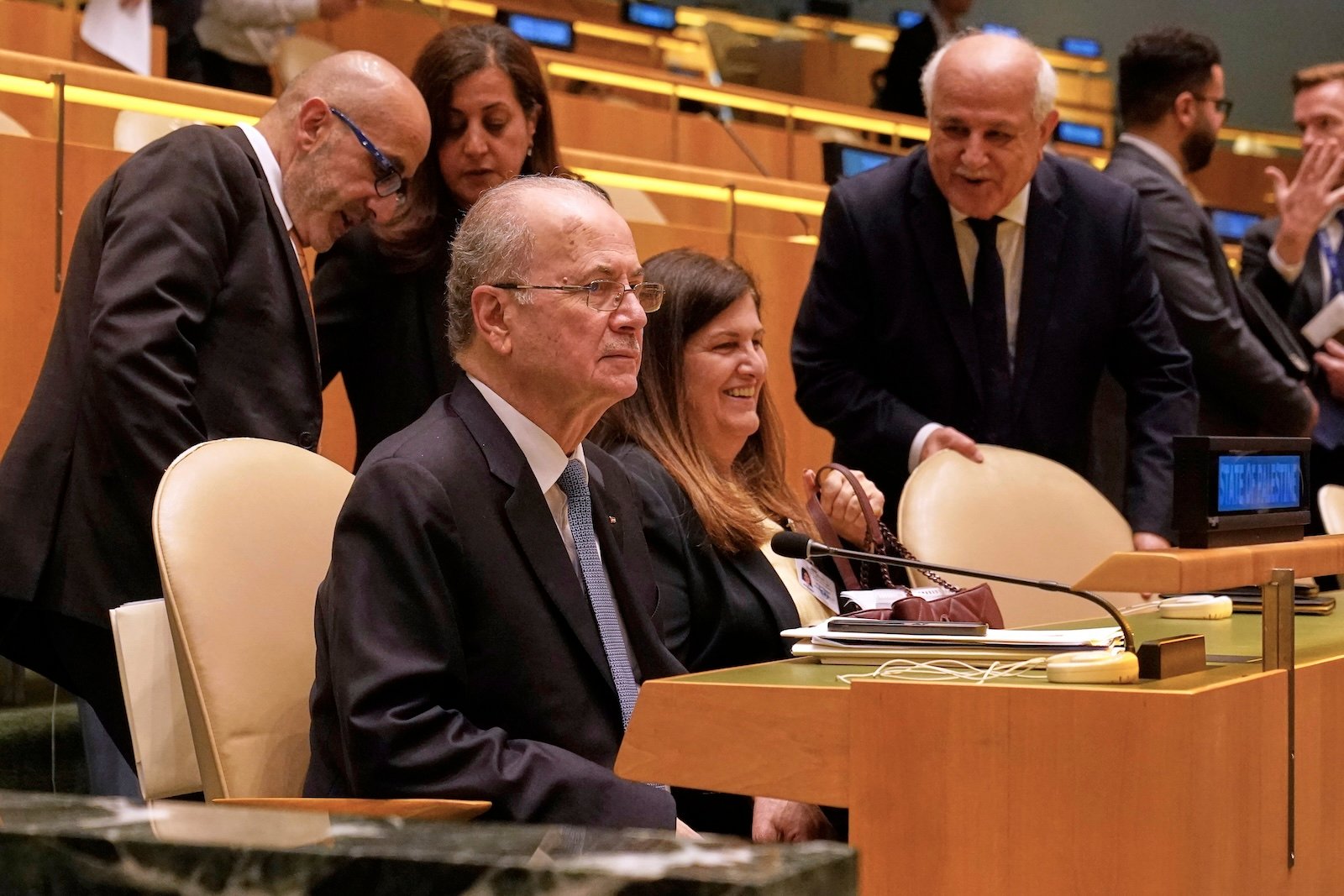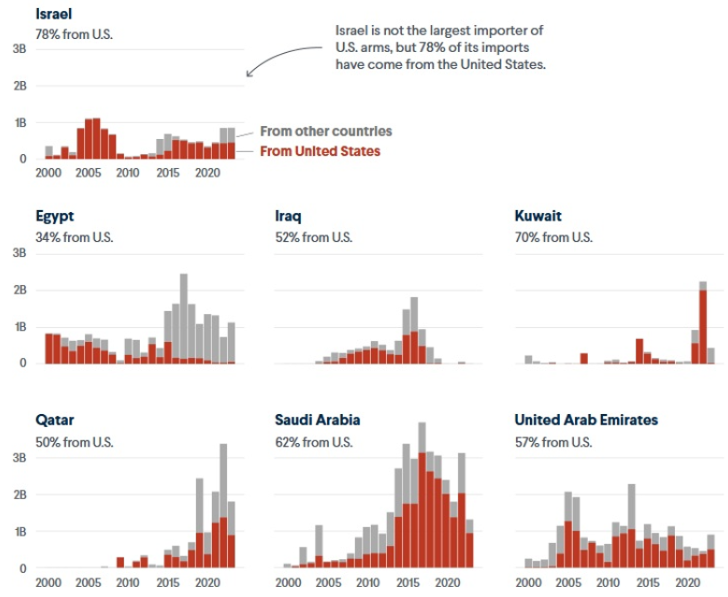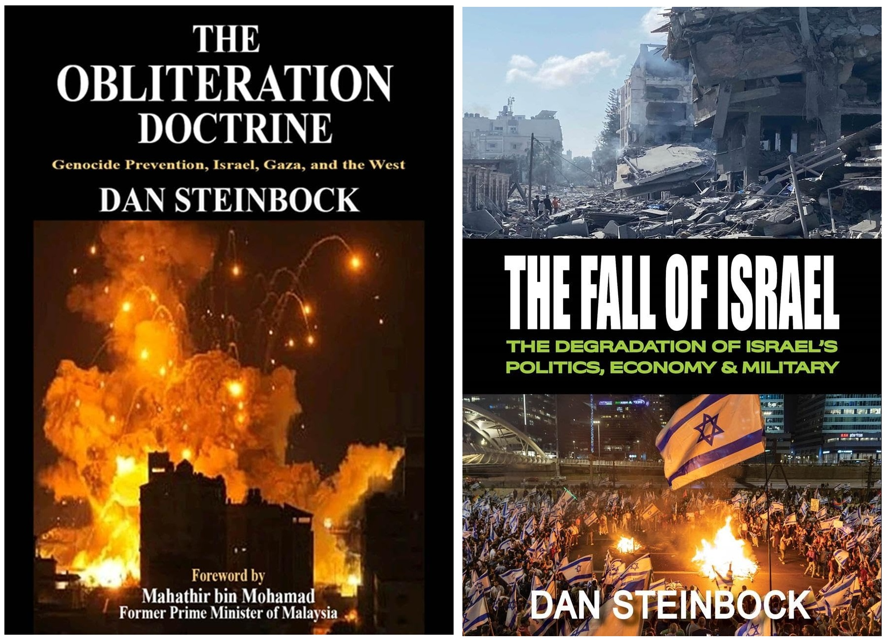As evidenced by complicity in the Gaza genocide, the U.S.-Israel military symbiosis in the Middle East is increasingly shunned by the international community. What the region needs is aggressive economic development.

Palestinian Prime Minister Mohammed Mustafa, foreground, arrives to address the United Nations General Assembly on July 28, 2025. Seventeen countries, the European Union, and the Arab League endorsed the New York Declaration a week ago. (Photo: Richard Drew/AP)
Recently, a high-level UN conference urged Israel to commit to a Palestinian state and gave “unwavering support” to a two-state solution. The “New York Declaration” set out a phased plan to end the eight-decade conflict and the ongoing Gaza catastrophe.
Co-chaired by France and Saudi Arabia, the EU, the Arab League and 15 countries, the conference envisioned an independent, demilitarized Palestine living side by side peacefully with Israel, and their eventual integration into the broader Middle East.
Last week, China joined the New York Declaration. As foreign ministry spokesperson Guo Jiakun stated, “we support all efforts that are conducive to the political settlement of the question…, and the ultimate, comprehensive, just and lasting resolution of the Palestinian question.”
Palestine and thereby the broader Middle East are now at a critical inflection point. For decades, U.S. efforts at “normalization” have unleashed ever-greater devastation in the region, which is crying for a peaceful development scenario, championed by China and the largest economies of the Global South.
America’s effective Middle East strategy
The Biden administration’s Middle East plan – the “grand bargain” – built on the first Trump administration’s Abraham Accords, which were preceded by Israel’s peace treaties with Egypt (1979) and Jordan (1994) and the Oslo Accords with the Palestinian Authority (1993–95). These accords are premised on Arab-Israeli normalization, particularly between Israel and the UAE and Bahrain. With the U.S. as the behind-the-façade architect, deals with Morocco and Sudan were announced between September 2020 and January 2021, respectively. The grand bargain was premised on the marginalization of Chinese trade and investment presence in the Middle East – and on the sidelining of the Palestinians.
Yet, ever since the Gaza hostilities, Israel’s relentless bombing and Biden’s support of Netanyahu’s war cabinet, the talks have stalled as bilateral trust between Israel and the Gulf states has eroded. In a sense, this is the logical effect of America’s effective Middle East strategy, as opposed to its rhetorical diplomatic stance. After all, the real money is not in peace talks, but in arms sales.
America is the court supplier of all major military powers in the Middle East. In the case of its closest allies, the U.S. provides 60 to 80 percent of their lethal imports (Israel, Kuwait, Saudi Arabia). In the rest, it accounts for 50 to 60 percent of the total (UAE, Iraq, Qatar), followed by Egypt (34%) whose primary suppliers are mainly America’s NATO allies (Germany, Italy), as well as Russia.
U.S. Arms Sales in the Middle East

Estimated military value of arms imports. These countries include the largest recipients of US arms sales in the Middle East (Source: SIPRI)
The steady, progressive flow of arms into the troubled region has been the primary contributor to its geopolitical volatility and economic uncertainty, particularly in the light of the military symbiosis between the U.S. and Israel.
In the context of Israel facing ICJ and ICC charges related to genocide, such arms transfers would seem to violate customary international law, including the International Law Commission’s Draft Articles on Responsibility of States for Internationally Wrongful Acts, and International Humanitarian Law, including Common Article 1 to the four Geneva Conventions of 1949.
Obviously, both the U.S. and Israel have rejected all such charges. Instead, Washington has aggressively sanctioned the ICC and its prosecutorial authorities.
China's BRI stance in the Middle East
In the past decade or so, China has emerged as a credible and peaceful intermediary among the different stakeholders in the Middle East. In addition to investing significantly in countries in which the U.S. is known and notorious for its military aid and regime change operations, Beijing has achieved several diplomatic coups.
For decades, U.S. administrations fostered a divide between Saudi Arabia and Iran, the Sunni and Shia leaders of Middle East geopolitics. Yet, in March 2023, these two countries announced the resumption of bilateral relations, following a deal brokered by China. After decades of U.S.-led sanctions, Iran hoped to focus on economic development, whereas Riyadh was intent on realizing the Saudi Vision 2030 of a more diversified, less oil-reliant economy.
In July 2024, China played a vital role in fostering Palestinian national unity in what became known as the Beijing Declaration, signed by 14 different Palestinian factions, most prominently by Fatah and Hamas. In the subsequent weeks, Israel, supported by U.S. arms and military financing, intensified its assassination campaign against these Palestinian leaders – which also led to the recent attack in Doha.
In 2015, years of challenging talks resulted in a nuclear deal (Joint Comprehensive Plan of Action, JCPOA) between Iran, the U.S., and a set of world powers. Despite Iran’s adherence to it, the Trump administration pulled the U.S. out of the deal in 2018. In the White House, regime change in Iran remains tempting, due to Tehran’s huge regional economic and geopolitical importance.
China has exclusive rights to several Iranian oil and natural gas fields. As part of a 2016-2017 agreement, some Chinese military leaders argued Beijing would regard a foreign attack on these areas as an attack on its own sovereign territory. Two years later, Iran joined China’s Belt and Road (BRI) initiative. In March 2021, the countries signed a 25-year and $400-billion strategic cooperation agreement. (Despite these deals, Israel attacked Iran in 2024 while the U.S. bombed Iran’s nuclear facilities in June 2025.)
In August 2024, Beijing sent an even stronger signal about its commitment by establishing a Second Silk Road in the region. It ensued after major Chinese investments in Saudi Arabian stocks and the signing of MOUs worth $50 billion with six major Chinese financial institutions. And in July 2025, China and Egypt expanded their bilateral cooperation across various economic sectors.
The progressive rise of China’s economic presence in the Middle East remains a matter of great concern in Washington.

The Fall of Israel (2024) and The Obliteration Doctrine (2025) by Dr Dan Steinbock
The militarization of U.S. foreign policy
Yet, the real problem is not Gaza, Iran or China, but the gross militarization of U.S. foreign policy. In September 2012, Karl W. Eikenberry, former U.S. ambassador to and commanding general of Afghanistan, warned that in the past 50 years American foreign policy has become “excessively reliant on military power.” Supported by its global military web, the U.S. has been in war, engaged in combat, or has otherwise employed its forces in foreign countries in all but 11 years of its existence.
Since the establishment of the first U.S. bases in Israel in the late 2010s, Israel’s military actions have escalated dramatically, as evidenced by the Gaza catastrophe, the attendant attacks in neighboring Arab states, such as Lebanon and Syria, and even further in Iran and Yemen, and most recently in Qatar – a key U.S. ally in the region.
Since 1945, Washington has relied on a dark record of regime change and destabilization in the Middle East. The post-9/11 wars alone have cost over $8 trillion and the lives of more than 1 million people, whereas in Gaza, the U.S. is complicit to genocidal atrocities, due to its massive military aid and financing of hostilities. This disastrous performance is driving a rethink in the Trump White House where Pentagon officials, headed by Elbridge Colby, are reportedly proposing the department prioritize protecting the homeland and Western Hemisphere, a striking reversal from the military’s focus on the “China threat” – and one that Washington’s neoconservatives won’t easily accept.
Yet, the simple truth is that the era of U.S. destabilization policies is over in the Middle East. The time for aggressive economic development, led by China and the Global South, has arrived.
Obliteration wars are no solution to 21st century challenges.
